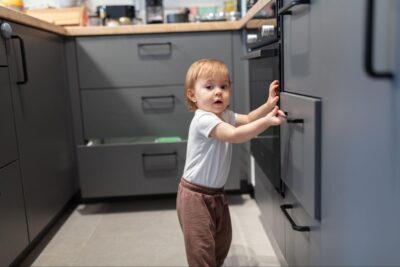Bringing a baby into your home is an exciting and joyful experience, but it also comes with new responsibilities—especially when it comes to safety. Babies are naturally curious and love to explore, which means it’s crucial to babyproof your home before they start crawling and walking.
To help you create a safe environment for your little one, we’ve compiled the ultimate babyproofing checklist. This guide will walk you through room-by-room safety measures to ensure your home is as secure as possible.
General Babyproofing Tips for Every Room
- Install outlet covers on all electrical outlets.
- Secure heavy furniture, such as bookshelves and dressers, to the wall to prevent tipping.
- Use corner guards on sharp furniture edges.
- Keep small objects, choking hazards, and toxic substances out of reach.
- Secure blind cords with cord wind-ups or cordless blinds to prevent strangulation.
- Install safety gates at the top and bottom of stairs.
- Use door knob covers or safety locks to prevent access to dangerous areas.
- Place non-slip pads under rugs to prevent slipping.
- Keep emergency numbers, including Poison Control (1-800-222-1222), easily accessible.
Babyproofing the Living Room
- Secure televisions with wall mounts or safety straps.
- Keep remotes, batteries, and other small objects out of reach.
- Use outlet protectors on all accessible electrical sockets.
- Block access to fireplaces with a sturdy baby gate.
- Remove or secure decorative items that could be pulled down.
Babyproofing the Kitchen
- Store cleaning supplies, detergents, and sharp objects in locked cabinets.
- Install stove knob covers and use back burners when cooking.
- Keep hot beverages and pots out of reach of curious hands.
- Use refrigerator locks to prevent access.
- Store plastic bags and choking hazards, such as small magnets, in a secure location.
- Ensure trash cans have childproof lids or are stored in locked cabinets.
Babyproofing the Bathroom
- Use toilet seat locks to prevent drowning hazards.
- Store medications, toiletries, and cleaning products in locked cabinets.
- Set water heater temperature to 120°F (49°C) to prevent burns.
- Use non-slip mats in the bathtub and on bathroom floors.
- Install a spout cover on the bathtub faucet to prevent head injuries.
- Never leave your baby unattended in the bath.
Babyproofing the Nursery
- Place the crib away from windows, cords, and furniture.
- Ensure crib slats are no more than 2 3/8 inches apart to prevent entrapment.
- Avoid using pillows, blankets, and stuffed animals in the crib to reduce the risk of suffocation.
- Use a firm mattress with a fitted sheet.
- Anchor dressers and bookshelves to the wall.
- Keep diapering supplies within reach but out of the baby’s grasp.
- Use a baby monitor to keep an eye on your little one.
Babyproofing the Bedroom
- Secure all heavy furniture to prevent tipping.
- Keep cords from lamps and electronics out of reach.
- Use a nightlight to help with nighttime navigation.
- Store laundry detergent and other potentially hazardous items in a locked cabinet.
Babyproofing the Laundry Room
- Keep detergents, bleach, and fabric softeners locked away.
- Always close and secure the washing machine and dryer doors.
- Store laundry baskets out of reach to prevent climbing hazards.
Babyproofing the Garage and Outdoor Areas
- Keep all tools, chemicals, and sharp objects locked away.
- Ensure all car doors are locked and keys are out of reach.
- Secure the garage door opener.
- Install a fence around pools or other water sources.
- Check for and remove any poisonous plants.
- Use locks on gates and ensure outdoor play areas are safe.
Final Babyproofing Steps
- Get down to your baby’s level and inspect each room for hidden hazards.
- Regularly check for recalls on baby products and toys.
- Educate family members and caregivers on babyproofing measures.
- Continually reassess your home as your baby grows and becomes more mobile.
Keeping Your Baby Safe with Wake Forest Pediatrics
Babyproofing your home is an essential step in ensuring your child’s safety as they grow and explore. If you have questions about babyproofing or other child safety concerns, the expert team at Wake Forest Pediatrics is here to help.
Schedule an appointment with us today to ensure your baby is growing in a safe and healthy environment!




